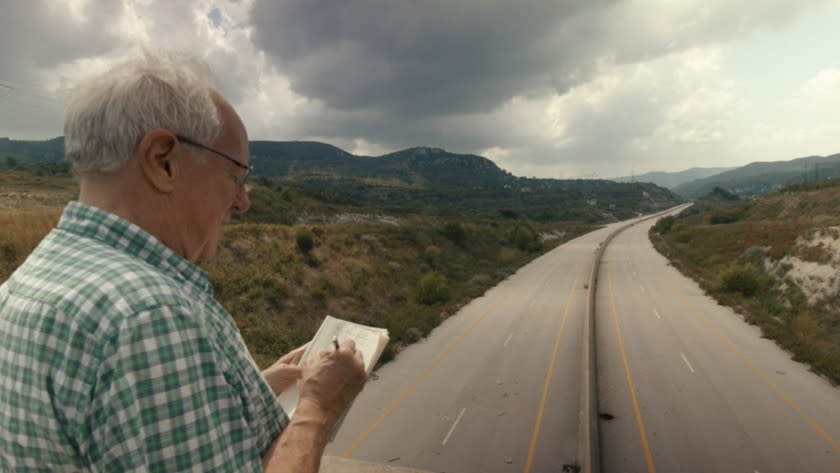Review: 'This Is Not a Movie' documents the on-the-ground reporting of journalist Robert Fisk

- Oops!Something went wrong.Please try again later.
In our current age of widespread mistrust in journalism lies the frustrating sense that many media consumers absorbing today’s information onslaught may not fully understand what reporters do and how and why they do it. That makes any worth-its-salt documentary spotlighting the profession’s standards and complexities something of a godsend, and Canadian filmmaker Yung Chang’s “This Is Not a Movie” — a profile of British journalist and longstanding Middle East correspondent Robert Fisk — is one of the more engaging and illuminating such offerings in recent memory.
An old school, pen-and-notepad practitioner of at-the-scene reportage with an abiding skepticism of official stories, the Beirut-based Fisk has called it as he’s seen it for more than 40 years (since 1989 for the U.K.’s the Independent), from Lebanon’s enduring unrest and the Israel-Palestinian conflict through wars in Afghanistan — he’d interviewed Osama bin Laden a handful of times — Bosnia, Algeria, Iraq and now Syria. Chang quickly establishes the breadth of his subject’s front-line bona fides, first with archival footage from 1980 of Fisk dodging bullets in the Iran-Iraq war, then segueing to 2018 as he follows the now-septuagenarian journalist through demolished Homs, Syria, and into the center of an anticipated final battle in Idlib between Islamist militias and Syrian President Assad’s forces.
When Fisk doesn’t find the usual signs of war buildup, however, he reexamines the handed-down hype of imminent bloodshed. That kind of question-the-narrative mind-set has stayed with him since his younger days covering the Troubles in Belfast in the early ’70s, when he rankled authorities by reporting on the British army’s deceptions. Decades later, in Syria, he notoriously challenged whether a widely reported chemical attack had occurred in Douma, citing his own on-the-ground sources. His coverage in the Independent drew charges of propping up Assad’s regime. But Fisk — who has been called every reputation-besmirching label a journalist can hear — reports what he discovers, not what he finds on the internet. What people make of his dispatches doesn’t affect him. As he forcefully puts it in the film, “You cannot get near the truth without being there.”
Fisk, who exudes equal parts confidence and curiosity, describes his job as one in which emotions can never play a part and neutrality is important, but admits that bias is unavoidable and should be deployed to amplify the voices of the suffering and oppressed. That has made him especially focused on the plight of Palestinians — he was one of the first outside journalists with eyewitness accounts of the 1982 Sabra-Shatila massacres of Palestinians in Beirut’s refugee camps, and he says it’s the only story to spark nightmares. (The mix of archival photos and Fisk’s own descriptions of what he saw are a horrific combo, be warned.)
Chang is no stranger himself to stories of people overwhelmed by larger forces, having made the observationally keen documentary about China’s Three Gorges dam, “Up the Yangtze.” He obviously admires Fisk as an intrepid, power-challenging figure of principle, emphasizing the journalist’s unassuming doggedness and clear-eyed views about covering the Middle East’s woes and handling the seismic shifts in his own profession. (The Independent has been digital-only since 2016, and Fisk sees online as neither all good nor all bad.)
Though Fisk is driven by fact-finding, no matter how messy information can be, he does put a premium on context. That approach doesn’t always win him fans either, as exemplified in a charged snippet we hear from a radio program the day after 9/11, when Fisk’s entreaty to examine the reasons behind the terrorist attack are met with name-calling fury by a not-ready-for-moral-relativism Alan Dershowitz.
Chang himself avoids the typical documentary context of secondary interviews, preferring the fullness of his subject as all the character we need. And certainly with a life and job as consuming as Fisk’s such added testimonials aren’t missed in the swirl of Fisk’s running commentary, pungent archival footage and verité scenes, whether in the field chasing stories or in his Beirut apartment poring through newspapers over a mug of tea.
However one ultimately feels about Fisk’s reportorial compass, “This Is Not a Movie” presents a necessary, thought-provoking portrait of a dedicated truth-seeker.
This story originally appeared in Los Angeles Times.

